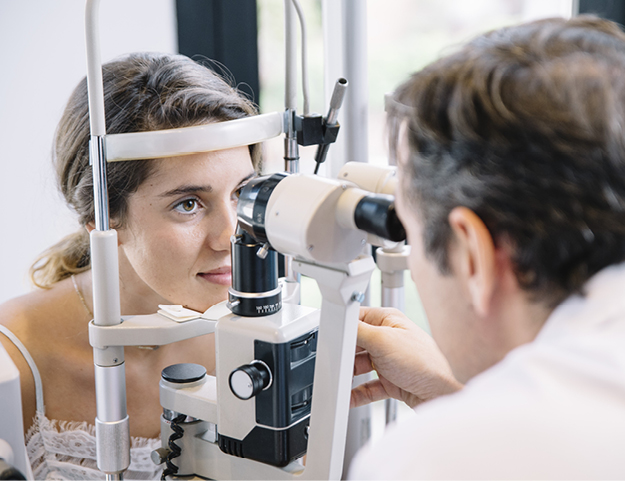It is often said that your eyes are the windows into the soul, a sentimental thought indeed, but in reality your eyes can be the windows into your overall health: which is why it is important to know how to keep them healthy & fit, just as you do the rest of your body.
By: DR. CHRISTINE LAUBE, OD | Advanced Family Eye Care
Q: I have perfect 20/20 vision, is it really necessary that I get my eyes examined? I have perfect 20/20 vision, is it really necessary that I get my eyes examined?
A: Yes! Everyone should get their eyes checked every 1-2 years depending on their personal and family health history. Kids should be checked prior to entering kindergarten. School screenings are a great tool and pick up many visual problems but they should never be in place of a thorough eye exam. Some children suffer from farsightedness (difficulty reading near) or amblyopia (considered to be a “weak” or “lazy” eye by many) – both of which should be addressed at an early age so that the visual system fully develops. Once the area of the brain that is responsible for vision is developed, it is very difficult to improve one’s vision. This critical age is typically around 10.
There are eye diseases, such as glaucoma, which are generally caught only by routine examination that have no symptoms but are sight threatening. In addition, routine dilated exams can be early detection and control verification for high blood pressure, diabetes, high cholesterol and other systemic medical conditions. Even if your vision is perfect, a comprehensive dilated eye exam should be part of your preventative medical routine.
Q: Why do my eyes tear up a lot in the winter?
A: Epiphora or excessive tearing is often a symptom of dry eye. During the winter, the humidity is much lower and dry eye is more prevalent due to the lack of moisture in the air. There are several layers to the tear film and if one or more of these layers are not functioning properly then the aqueous tears are over produced but don’t actually stay on the eye to keep it lubricated. The result is a dry but teary eye. Over the counter drops can sometimes worsen the problem if the wrong drops are used. A comprehensive ocular examination is helpful in determining the cause of the dry eye and a treatment regimen can be recommended.
Q: I am a full-time contact lens wearer, how often should I clean them? I have a favorite case that I have used for years now, is that ok?
A: Contact lenses worn on any schedule greater than one day disposable need to be disinfected every day with an appropriate disinfection solution recommended by your eye care professional. The unfortunate circumstance about noncompliant contact lens wear is that it can lead to a very painful sight threatening condition known as a corneal ulcer. The American Optometric Association informs all contactlens wearers about a few simple rules and recommendations about contact lenses:
1. Carefully and regularly clean contact lenses as directed by your optometrist.
2. Rub the contact lenses with your fingers and rinse them thoroughly before soaking the lenses overnight in a multipurpose solution that completely covers each lens.
3. Store lenses in the proper lens storage case, and replace the case at least every three months. Clean the case after each use, and keep it open and dry between cleanings.
4. Use only products recommended by your optometrist to clean and disinfect your lenses. Saline solution and rewetting drops do not disinfect lenses.
5. Use only fresh solution to clean and store contact lenses. Never reuse old solution. Change the contact lens solution according to the manufacturer’s recommendations, even if you don’t use the lenses daily.
6. Always follow the recommended contact lens replacement schedule your optometrist prescribes.
7. Remove contact lenses before swimming or entering a hot tub. 8. See your optometrist for your regularly scheduled contact lens and eye examination.
Q: I do not like to have my eyes dilated, it is inconvenient and my schedule is too busy. Why is it important for my eyes to be dilated?
A: Dilation of the eyes is important because it allows the eye doctor to thoroughly examine the inside lining and structures of the eye. Without dilation the pupil of the eye constricts and restricts the view inside depending on the amount of light shined into the eye. Unfortunately, there are many conditions both ocularly and medically which can effect the retina of the eye and ultimately one’s vision or health. Conditions such as retinal detachment, retinal and brain tumors, diabetes, hypertension, sickle cell and glaucoma are just a few to mention. Some conditions may not have any initial visual symptoms and patients may not realize a sight threatening or medical condition is looming. The effects of dilation usually last between 2-4 hours with an increased sensitivity to light and some difficulty reading at near. Newer technology in the market, known as the Optomap exam, enhances and elevates the level of examination of the retina, as well as digitally imaging the widest view of the retina. Because it does not require dilation it is preferred by many patients, however, it is not to be confused with taking the place of dilation of the eye because it does not allow the doctor to see the retina in a 3-dimensional view or the far reaches of the eye.

Dr. Christine Laube, O.D. Advanced Family Eye Care Dr. Laube earned her Bachelor of Science from Ohio University and her Doctor of Optometry from Southern College of Optometry in Memphis, Tennessee in 1999. Having some traumatic eye exams growing up she decided to dedicate her profession to providing the most comprehensive and caring treatment for every patient. Dr. Laube wears RGP contact lenses and is therefore very familiar with the most challenging specialty contact lens fits.













